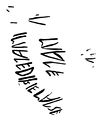AK-1.2: Difference between revisions
No edit summary |
|||
| Line 29: | Line 29: | ||
Length min. 23 cm; the last character at about 110 cm above the ground. Running downwards on a small protrusion on the very left edge of the rock wall, the middle one of a group of three (Bildstelle 1, incl. [[index::AK-1.1]] and [[index::AK-1.3]]). | Length min. 23 cm; the last character at about 110 cm above the ground. Running downwards on a small protrusion on the very left edge of the rock wall, the middle one of a group of three (Bildstelle 1, incl. [[index::AK-1.1]] and [[index::AK-1.3]]). | ||
Traces of characters can be seen starting from the darker area of rock above the inscription, but apart from possible {{c||U5}} at about 10 cm before {{c||N}} no reading can be offered. The last five letters, however, are unambiguous, representing the suffix syntagma {{m||-nu}}{{m||- | Traces of characters can be seen starting from the darker area of rock above the inscription, but apart from possible {{c||U5}} at about 10 cm before {{c||N}} no reading can be offered. The last five letters, however, are unambiguous, representing the suffix syntagma {{m||-nu}}{{m||-le|-ale}}, well attested in the rock inscriptions of North Tyrol. We can therefore assume that the illegible part of the inscription contained at least the personal name base for the patronymic. The degree of erosion as well as the occurring letter forms are similar to those of [[index::AK-1.1]], the inscriptions may therefore have been written on the same occasion and by the same person. | ||
{{bibliography}} | {{bibliography}} | ||
Revision as of 17:07, 11 February 2017
| Inscription | |
|---|---|
| Transliteration: | ?]nuale |
| Original script: | |
|
| |
| Object: | AK-1 rock (stone) (Inscriptions: AK-1.1, AK-1.2, AK-1.3, AK-1.4, AK-1.5, AK-1.6, AK-1.7, AK-1.8, AK-1.9, AK-1.10, AK-1.11, AK-1.12, AK-1.13, AK-1.14, AK-1.15, AK-1.16, AK-1.17, AK-1.18, AK-1.19, AK-1.20, AK-1.21) |
| Position: | left-hand side"left-hand side" is not in the list (front, back, top, bottom, inside, outside, neck, shoulder, foot, handle, ...) of allowed values for the "position" property. |
| Orientation: | 90° |
| Script: | North Italic script |
| Direction of writing: | sinistroverse |
| Letter height: | 1010 cm <br /> – 14.7 cm |
| Number of letters: | 5 |
| Number of lines: | 1 |
| Craftsmanship: | engraved |
| Current condition: | damaged |
| Archaeological culture: | La Tène |
| Date of inscription: | 5th–1st centuries BC |
| Date derived from: | |
|
| |
| Language: | Raetic |
| Meaning: | 'of/by the son of X' |
|
| |
| Alternative sigla: | none |
Images
|
Inscription AK-1.2.
|
Tracing of inscriptions on AK-1 rock.
|
Inscription AK-1.2.
|
Commentary
Not previously published. Autopsied by TIR in July 2014.
Image in Mandl 2011: Abb. 138 (photo). Photo of the entire rock wall in Mandl 2011: Abb. 136.
Length min. 23 cm; the last character at about 110 cm above the ground. Running downwards on a small protrusion on the very left edge of the rock wall, the middle one of a group of three (Bildstelle 1, incl. AK-1.1 and AK-1.3).
Traces of characters can be seen starting from the darker area of rock above the inscription, but apart from possible ![]() at about 10 cm before
at about 10 cm before ![]() no reading can be offered. The last five letters, however, are unambiguous, representing the suffix syntagma -nu-ale, well attested in the rock inscriptions of North Tyrol. We can therefore assume that the illegible part of the inscription contained at least the personal name base for the patronymic. The degree of erosion as well as the occurring letter forms are similar to those of AK-1.1, the inscriptions may therefore have been written on the same occasion and by the same person.
no reading can be offered. The last five letters, however, are unambiguous, representing the suffix syntagma -nu-ale, well attested in the rock inscriptions of North Tyrol. We can therefore assume that the illegible part of the inscription contained at least the personal name base for the patronymic. The degree of erosion as well as the occurring letter forms are similar to those of AK-1.1, the inscriptions may therefore have been written on the same occasion and by the same person.
Bibliography
| Mandl 2011 | Franz Mandl, Felsbilder. Österreich – Bayern: Nördliche Kalkalpen [= Anisa – Verein für alpine Forschung 4], Haus im Ennstal: 2011. |
|---|




